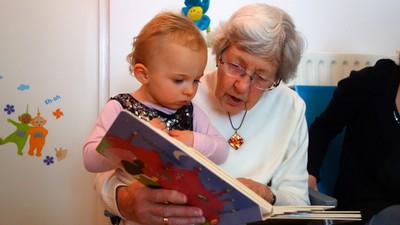Why Tell Stories to Children
by Anna Sawa

Children love listening to stories. It is a natural way for them to assimilate a language. For this reason, teachers use storytelling as a perfect introduction to the foreign language in a familiar context. What is more, stories are motivating and develope social skills.
Language skills
Stories set the language in a natural, meaningful and enjoyable context. They link well to different topics across the curriculum and develop children's language skills in a holistic way. Listening to stories children repeat and recycle language naturally, because they like to hear the same stories over and over again. Besides, many stories contain repetition of key vocabulary and structures what develop their fluency in speaking. Storytelling is an opportunity to familiarize children with sounds, rhythm and intonation of the language.
Motivation
Stories are enjoyable, motivating and fun. That is why, they are create positive attitude to the language and desire to continue learning. They engage children's interest, attention and imagination. Young students are very often personally involved in a story and identify with the characters, their adventures and emotions. They increasingly develope their ability to understand, retell, act out and create their own stories. What is more, stories appeal to children with different intelligences and learning styles.
Social skills
Listening to stories children develope understanding of themselves and the world around them. Storybooks teach about ethical behaviour and enable children to make critical judgments. Storytelling provides a framework for such social skills as listening, concentration, turn taking, collaborating and respect for others. Children participate in storytelling by sharing natural emotional resposes like laughter, happiness, sadness or excitment. Acting out the stories encourage children to work together what develop their social skills in different real situations.